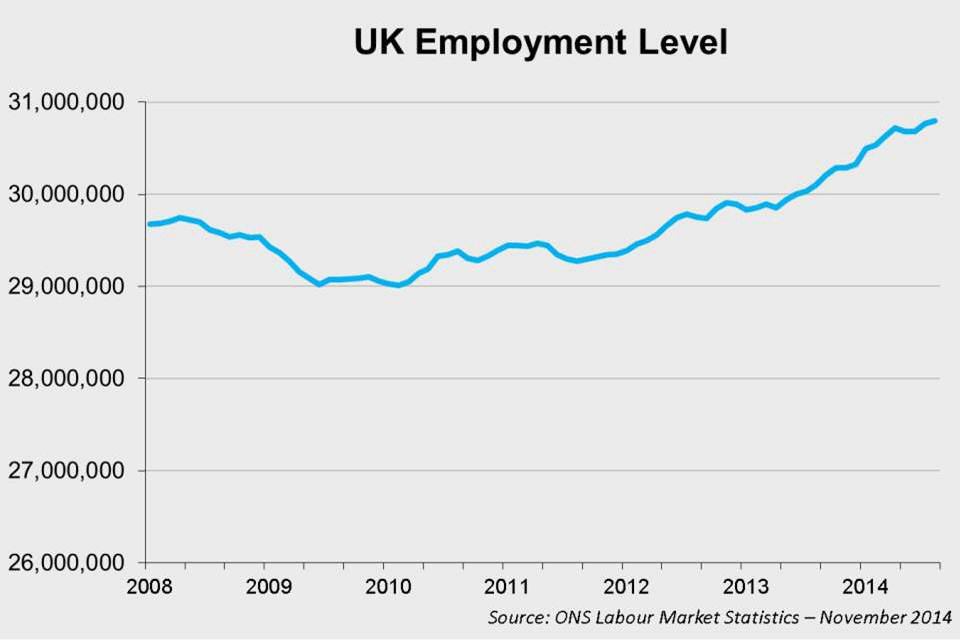Record-breaking number of people in jobs
A record-breaking number of people are now in work, averaging over 13,000 more people in jobs every single week over the last year.

Department for Work and Pensions
Since 2010 two-thirds of the rise in employment has been in managerial, professional or associate professional occupations.
The figures from the Office for National Statistics show that 694,000 more people are in jobs compared to this time last year. Employment increased by 112,000 over the last 3 months alone, with the vast majority of the increase coming from people in full-time jobs.
There are now a record 30.8 million people in work, with the employment rate (73.0%) now back to pre-recession levels. Compared to 2010 there are over 2 million more people in private sector jobs, showing that the government’s long-term economic plan to create jobs by backing businesses is working.

UK employment level
Wages are increasing – average regular pay (excluding bonuses, in the 3 months to September) rose 1.3% on the year, with private sector pay up 1.6%. This compares to an increase in the Consumer Prices Index of 1.2% in September.
Employment Minister Esther McVey said:
Record numbers of people in work means more people with the security of a regular wage who are better able to support themselves and their families.
With the vast majority of the rise in employment over the last year being full-time, it’s clear that thanks to the government’s long-term economic plan, we are helping businesses to create the jobs that people need.
More young people are getting their foot on the career ladder and we’ve seen record falls in female unemployment, so as the economy continues to grow, more and more people are having their lives transformed by moving into work.
There are over half a million fewer unemployed people than there were a year ago with schemes like the government’s Work Programme contributing to the biggest annual fall in long-term unemployment in 16 years – down by 206,000.
The number of people claiming the main unemployment benefit – Jobseeker’s Allowance – has also been falling every month for the last 2 years and is now over half a million lower than May 2010.
Young people
Youth unemployment fell by nearly a quarter of a million over the last year. The number of 18 to 24 year olds claiming Jobseeker’s Allowance has been falling for the last 35 months and is the lowest since the 1970s. Excluding full-time students, the number of unemployed young people is now 163,000 lower than in 2010.
Women
The annual fall in female unemployment is the largest on record. There are record numbers of women in work, and since 2010 three-quarters of the rise in female employment has come from managerial, professional and associate professional occupations. The UK has seen the fastest growth in the number of women in work in the last year out of all G7 economies. Of those women working part-time, nearly 9 in 10 have chosen to work part-time because it suits them. The number of women working part-time who want full-time work is falling, down 43,000 over the last year.
International comparisons
Over the last year the UK has seen the largest growth in the employment rate and the largest fall in the unemployment rate in the G7.
Vacancies
Today’s figures show that vacancy numbers are now very close to pre-recession levels, having increased 25% on the year to 687,000.
Read the Labour Market Statistics – November 2014 from the Office for National Statistics.
Universal Credit statistics
New official statistics have also been published today showing the latest number of claims to Universal Credit.
Contact Press Office
Media enquiries for this press release – 020 3267 5161
Press Office
Caxton House
Tothill Street
London
SW1H 9NA
Telephone: 0115 965 8781
Follow DWP on:
- Twitter – www.twitter.com/dwppressoffice
- Facebook – www.facebook.com/dwp
- LinkedIn – www.linkedin.com/company/dwp
- YouTube – www.youtube.com/dwp